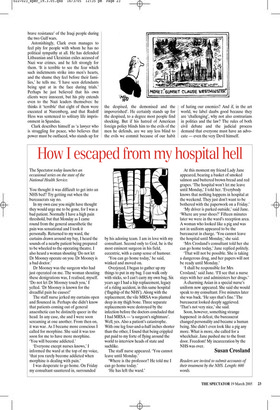How I escaped from my hospital hell
The Spectator today launches an occasional series on the state of the National Health Service.
You thought it was difficult to get into an NHS bed? Try getting out when the bureaucrats say no.
In my own case you might have thought they would urge me to be gone, for I was a bad patient. Normally I have a high pain threshold, but that Monday as I came round from the general anaesthetic the pain was sensational and I took it personally. Returned to my ward, the curtains drawn around my bay, I heard the sounds of a nearby patient being prepared to be wheeled to the operating theatre. I also heard a woman shouting ‘Do not let Dr Mooney operate on you. Dr Mooney is a bad doctor.’ Dr Mooney was the surgeon who had just operated on me. The woman shouting these denigrations was, I realised, myself. ‘Do not let Dr Mooney touch you,’ I yelled. ‘Dr Mooney is known for the dreadful pain he causes!’ The staff nurse jerked my curtains open and flounced in. Perhaps she didn’t know that patients coming out of general anaesthetic can be distinctly queer in the head. In any case, she and I were soon screaming at one another. From then on, it was war. As I became more conscious I called for morphine. She said it was too soon for me to have more morphine. ‘You will become addicted.’ ‘Everyone except nurses knows,’ I informed the ward at the top of my voice, ‘that you rarely become addicted when morphine is dealing with pain.’ I was desperate to go home. On Friday my consultant sauntered in, surrounded by his adoring team. I am in love with my consultant. Second only to God, he is the most eminent surgeon in his field, eccentric, with a camp sense of humour.
‘You can go home today,’ he said, winked and moved on.
Overjoyed, I began to gather up my things to put in my bag. I can walk only with sticks, so I can’t carry my own bag. Six years ago I had a hip replacement, legacy of a riding accident, in this same hospital (‘flagship of the NHS’). Along with the replacement, the vile MRSA was planted deep in my thigh bone. Three separate replacements were destroyed by the infection before the doctors concluded that I had MRSA — ‘a surgeon’s nightmare’. Well, yes. Also a patient’s catastrophe. With one leg four-and-a-half inches shorter than the other, I found that being crippled put paid to my forte of flying around the world to interview heads of state and suchlike.
The staff nurse appeared. ‘You cannot leave until Monday.’ ‘Where is the professor? He told me I can go home today.’ ‘He has left the ward.’ At this moment my friend Lady Jane appeared, bearing a basket of smoked salmon and buttered brown bread and red grapes. ‘The hospital won’t let me leave until Monday,’ I told her. ‘Everybody knows that nothing happens in hospital at the weekend. They just don’t want to be bothered with the paperwork on a Friday.’ ‘My driver is parked outside,’ said Jane. ‘Where are your shoes?’ Fifteen minutes later we were in the ward’s reception area. A woman who looked like a pig and was not in uniform appeared to be the bureaucrat in charge. ‘You cannot leave the hospital until Monday,’ she said.
‘Mrs Crosland’s consultant told her she can go home today,’ Jane replied politely.
‘That will not be possible. She is taking a dangerous drug, and her papers will not be ready until Monday.’ ‘I shall be responsible for Mrs Crosland,’ said Jane. ‘I’ll see that a nurse stays with her and administers her drugs.’ A charming Asian in a special nurse’s uniform now appeared. She said she would speak to my consultant. Five minutes later she was back. ‘He says that’s fine.’ The bureaucrat looked deeply aggrieved. ‘That’s not very nice,’ she said.
Soon, however, something strange happened: in defeat, the bureaucrat changed personality and became a human being. She didn’t even look like a pig any more. What is more, she called for a wheelchair. Jane pushed me to the front door. Freedom! My incarceration by the NHS was over.
Susan Crosland
















































 Previous page
Previous page